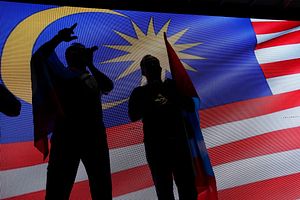Gay sex scandals have a history of destroying rising stars in Malaysian politics, and the latest has exposed a growing rift over who will succeed Mahathir Mohamad as leader. But there are consequences beyond the fates of the embroiled politicians. Most notably, the case has also raised fresh concerns among Malaysia’s LGBTIQ+ communities at a time they’re already battling increasing persecution.
The scandal broke after videos purporting to show high-flying Economic Affairs Minister Mohamed Azmin Ali in bed with another man were circulated in June. Azmin, viewed as a future prime minister and a rival to Anwar Ibrahim, has denied the allegations as a “nefarious plot” to ruin his political career.
It’s a tried and true political weapon in Malaysia. Sodomy is a crime punishable by up to 20 years in jail. And although convictions are rare, Anwar, a popular former deputy prime minister sacked by Mahathir under his earlier rule, was jailed twice between 1999 and 2018 on sodomy charges. He always denied the charges, which were widely condemned as politically motivated.
Anwar’s unlikely political reunion with Mahathir, while still in prison, brought the Pakatan Harapan coalition to victory in last year’s general elections, paving the way for an extraordinary comeback. Yet despite Mahathir promising to hand power to Anwar, uncertainty looms over the succession. At the same time, Azmin is seen to be growing closer to the 94-year-old premier.
Numan Afifi, an openly gay Muslim based in Kuala Lumpur, says the latest scandal has “forced Malaysia back to the ordeal” of Anwar’s trial. Despite all of the advocacy work of the last 20 years it’s still being implied that LGBT people are “morally corrupt,” the gay rights activist said.
Days after the sex video was leaked, a former political aide from the People’s Justice Party — of which Anwar and Azmin are respectively president and deputy president — claimed he was the younger man in the footage and Azmin was the other. In a startling “confession” video on Facebook he claimed that that the minister was unfit to be a leader and should be investigated for corruption.
Afifi has called out this language for demonizing LGBT communities and is worried by the precedent set two decades ago. “Highly organized anti-LGBT groups formed in direct response to Anwar’s case. We’re worried that the same narrative is going to be used again,” he said.
Since coming to power on an agenda of liberal reform, Malaysia’s new coalition has been praised for positive steps such as greater press freedom. In recent weeks I’ve also written about bold government moves towards decriminalizing personal drug use and scrapping a colonial-era suicide law. But there are valid concerns that it is stalling on restoring other civil liberties including the prominent promise to repeal the repressive Sedition Act.
On LGBT issues the government “at a surface level appears friendlier,” Numan says, pointing to Religious Affairs Minister Mujahid Yusof Rawa meeting a leading trans advocate last year after which he reportedly said, “we must eliminate the culture of hate and discrimination against the (LGBT) community.” They are “willing to have a dialogue,” Numan added, which is a change from the earlier regime.
But such gestures have been overshadowed by a parallel and emphatic rejection of LGBT rights. Mahathir has said Malaysia “cannot accept” LGBT rights, views echoed by Anwar, head of the ruling coalition. Mujahid has also “promoted the scientifically discredited idea that LGBT people should and could “change” their sexual orientation or gender identity and return to the “right path,” according to a recent report in the Georgetown Journal of International Affairs.
While gay rights advocacy has become stronger in Malaysia over the last two decades, increasing visibility has also emboldened the backlash. There is ongoing “state-sanctioned homophobia,” says Thilaga Sulathireh, co-founder of trans rights group Justice For Sisters.
“We’re seeing constant political scapegoating of LGBT people since the election,” Thilaga told The Diplomat. “We’ve also been seeing increasing hate crimes against LGBT people, increased hate speech online, and a lot more complaints about workplace discrimination. This (recent) scandal is escalating the kind of homophobia and transphobia we have already been seeing.”
One worrying outcome of the videos, she adds, has been a growth in speculation over people’s actual or perceived sexual orientation. “Outing doesn’t just result in legal persecution but societal prosecution. People are being subjected to ideas such as having to repent at mosques for being LGBT or having homosexual feelings. Such calls for action can be very traumatizing and insert a lot of fear for LGBT people, especially in conservative households,” Thilaga said.
Last year a Sharia court sentenced two Muslim women to public caning on allegations they had attempted to engage in homosexual relations. Muslims are subject to Islamic laws as well as the civil code. Activists say violent crimes perpetrated by civilians are also on the rise. In January, a transwoman was killed on the outskirts of Kuala Lumpur, the third such killing in Malaysia in under two months. A month earlier attackers pulled two men from a car in Kuala Lumpur, a report said, beating them for allegedly engaging in same-sex intimacy and later sharing a video of the assault on social media.
LGBT rights have become a political battleground in Malaysia as opposition parties step up attacks against the government as out-of-touch with the conservative Muslim Malay majority. It’s led to politicians rushing to emphasize their so-called Islamic credentials. Yet leading Muslim voices in Malaysia — including advocacy groups, academics and lawyers — have spoken up for LGBT communities, in line with a small but growing number of Muslims going public in other parts of the world to argue that LGBT rights are compatible with their faith.
It’s crucial that Malaysia’s government takes action against homophobic narratives. “These words and comments on social media are starting to turn into physical violence on the streets. This is not just a sex scandal but about a community who wants to live free from prejudice and discrimination,” said Numan.

































